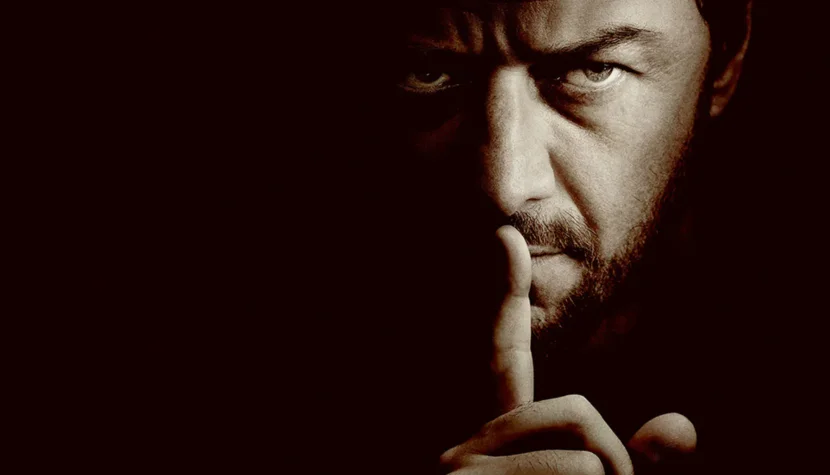SPEAK NO EVIL. Great James McAvoy, Mediocre Remake [REVIEW]

Christian Tafdrup’s “Speak No Evil” (2022), which made a splash in European cinemas two years ago, is one of those films that, at first glance, doesn’t stand out from the multitude of similar psychological dramas, but unexpectedly tugs at the viewer’s emotions and digs deep into an unsettling spectrum of fears and discomfort. The effect the Danish film had on audiences gained it wider attention, leading to interest from American producers—specifically, Blumhouse. Since international audiences (read: English-speaking) aren’t fond of subtitles, they launched the standard protocol of the global entertainment industry, known as the “English-language remake.” The result of translating this dark Danish thriller into a multiplex hit can now be seen in “Speak No Evil” by James Watkins.
Like the original, the American remake tells the story of a friendship formed at a Tuscan resort between two families. Ben and Louise are an American couple living in London with their daughter Agnes, both struggling with career difficulties. Their new acquaintances are Paddy and Ciara, a British couple from Devon, raising Ant, their younger son, who is mute due to a congenital tongue defect. The holiday friendship, like most holiday friendships, is a mix of fascination, awkwardness, and occasional fondness. A casual lunchtime suggestion to spend a weekend at Paddy and Ciara’s home seems like an insignificant part of small talk. But not this time.

When a letter arrives in London inviting them to the countryside, Ben and Louise, grappling with family issues, decide to visit their nearly unknown hosts. Upon arrival, despite the jovial hospitality, something feels off—Paddy serves roast goose to the vegetarian Louise as a welcome gesture, and the hosts’ behavior frequently crosses the boundaries of rural eccentricity. The longer the American couple stays at the farmhouse, the more disturbing things begin to happen around them. A game of hunter and prey ensues, where Paddy’s hunting rifles and knives are not the only weapons—social conventions, which compel the guests to accept increasingly uncomfortable transgressions in the name of politeness and saving face, are just as dangerous.
For about two-thirds of “Speak No Evil”, the script is a surface-level faithful copy of original. Watkins, along with Tafdrup overseeing the translation, closely adapts the key and most striking scenes from the original, trying to build the psychological tension between the predatory hosts and the timid guests. But the attempt falters: the American version fails to generate the same thick atmosphere of unease that characterized the Danish original. Not only is everything here brighter and cleaner, but Paddy and Ciara are also drawn in broader strokes, which lessens their impact. The aggressive hosts no longer explore the boundaries of good manners as intriguingly; instead, they resemble cartoonish villains from a remote house. Additionally, what was subtly hinted at or suggested in “Speak No Evil” (2022) is spelled out here with excessive precision, to the point where it sometimes feels like the actors are about to break the fourth wall and explain their motivations and behavior directly to the camera, as in a mockumentary. “Speak No Evil” is also more sanitized, with the most disturbing moments of the original replaced by more situational humor and typical American moralizing.

Heading further down the path of “popcornizing” this fascinating story about the limits of politeness and how modern culture neuters the instinct for self-preservation, Watkins also rewrites the final act, turning “Speak No Evil” into a reversed home-invasion thriller. At some point, the film about being lured into a behavioral trap effectively ends, and an average para-slasher begins, where all the interesting psychological contexts regarding the characters’ relationships are reduced to fuel for the obligatory plot points. The execution of the finale is poor in and of itself, but for those familiar with the ending of Tafdrup’s original, the mediocrity and kitsch of “Speak No Evil”‘s climax will be all the more painful. Watkins’s film is reworked to suit the stereotypical tastes of mainstream audiences, resulting in a movie that is almost—almost, because the screenwriters manage to pull one interesting original card at the very end—devoid of depth and bite.
If “Speak No Evil” has one undeniable strength, it’s James McAvoy in the role of Paddy. The Scottish actor seems to relish his role as the psychopathic hunter, as if channeling another personality from his character in “Split”. The more apathetic and soft Ben (played by Scoot McNairy) becomes, the stronger Paddy grows, with McAvoy masterfully showing how his character feeds on the discomfort and fear of his victims. His expressive facial expressions, wild outbursts, and animalistic charisma, reinforced by his newly acquired physicality, are impressive and carry the entire film, allowing viewers to overlook the flattened psychological nuances and the failure to build proper tension. I’d even say that James McAvoy, shouting “Eternal Flame” by The Bangles in a murderous rage, is something I never knew I wanted, and it’s almost worth the existence of “Speak No Evil” just for that brief scene.

McAvoy’s performance elevates what would otherwise be just another poor remake of a much better European film into something that’s ultimately quite watchable. It’s a shame that the Scottish actor didn’t give this performance in a film with a better script, as it had the potential to make cinema history, much like Jack Nicholson in “The Shining”. Unfortunately, Watkins is no Kubrick, and “Speak No Evil” is not a meticulously crafted spectacle of horror but one of many mass-produced thrillers. It’s yet another example—as if we needed more—that the term “American remake” has become synonymous with diluting and stripping away not only artistic ambition but also the ambiguity of the original message. “The Shining” proves that even the darkest stories can be concluded in a relatively positive way without compromising quality. Sadly, for filmmakers like Watkins, making a story more accessible equates to defusing its dramatic potential and leveling it down to mediocrity.

